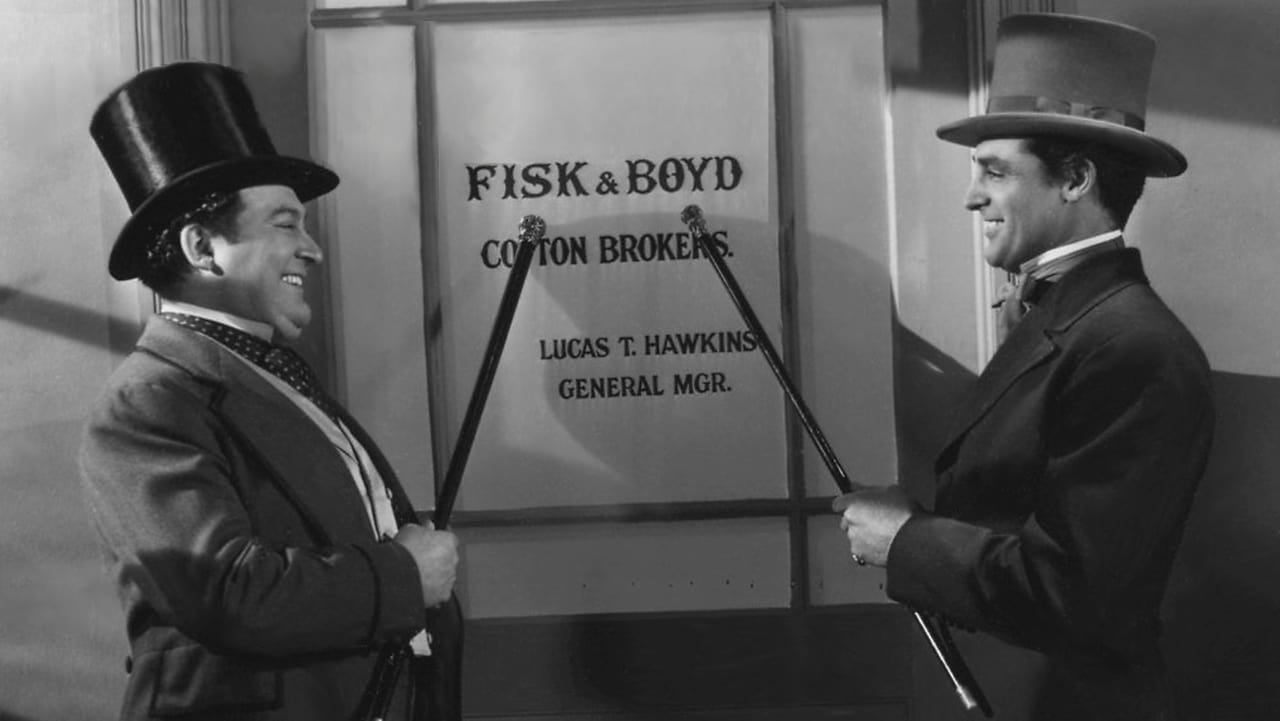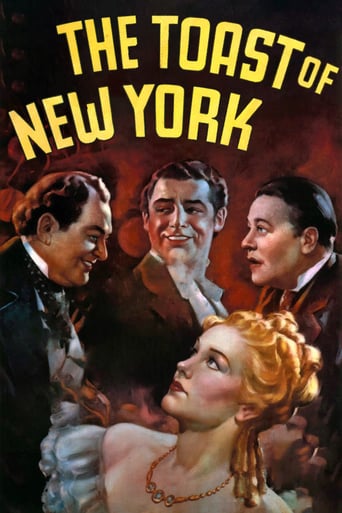

Purely Joyful Movie!
... View MoreMost undeservingly overhyped movie of all time??
... View MoreFantastic!
... View More.Like the great film, it's made with a great deal of visible affection both in front of and behind the camera.
... View MoreThis makes for interesting viewing in the wake of Martin Scorsese's THE WOLF OF WALL STREET (2013), even if I only intend checking that one out in time for the Oscar ceremony next month! It is the biopic of 19th century American financier Jim Fisk – a larger-than-life Edward Arnold – who rose to prominence from nothing but ultimately grew too big for his boots.The film has a nice period flavour, punctuated by the initial comedy sense of Fisk's petty swindles (done in cahoots with partners Cary Grant and Jack Oakie). Their fortunes turn during the Civil War, but Fisk's ambitions are set too high (taking on mild-mannered tycoon Donald Meek and Clarence Kolb as the famed Cornelius Vanderbilt) and his ruthless tactics certainly do not endear him to rivals and 'victims'. Eventually, Grant himself steps out to oppose him: though this has just as much to do with his personal feelings towards Fisk's girlfriend (played by the tragic Frances Farmer) – whom he at first frowns upon but then falls for (when pushed by Fisk himself to take care of her for him, while he is busy making more money for the two of them!).The whole is typical Hollywood entertainment of the era, the heyday of the biopics (though Warners had cornered the market in this field, the film under review is an RKO production) – even if the subject matter proves necessarily heavy-going to the casual viewer. The sheer professionalism with which this is made also extends to the bit parts – which, surprisingly yet very amusingly, include two of the most likable foils in the classic comedies of Laurel & Hardy, namely Billy Gilbert as a flustered (what else?) photographer and James Finlayson (curiously unbilled) as one of the myriad inventors who turn up at Fisk's firm hoping to be financed.
... View MoreIf Jim Fisk were alive and operating today, he'd be on television and would run that well known introvert Donald Trump right off the tube with bad ratings. It's how that colorful fellow operated, never did anything in a small way.Though the film has taken a great deal of liberty with the facts as has been pointed out by other reviewers, the essence of the man has been quite accurately captured by Edward Arnold. Also the characters of Uncle Dan'l Drew and Cornelius Vanderbilt are finely etched by Donald Meek and Clarence Kolb respectively.It's quite true that Fisk got the start of his fortune by running contraband cotton out of the South, taking advantage of the fact that the one crop Confederacy couldn't export its crop because of the Union blockade. I'm sure that things were pretty hairy for Fisk as well as for his fictional partners Cary Grant and Jack Oakie.Josie Mansfield as played by Frances Farmer was certainly not the first or last entertainer to take advantage of the attentions of a wealthy man. That was certainly demonstrated more accurately in Love Me or Leave Me by Doris Day as Ruth Etting. She was not as nice as Farmer and the script made her.Frances Farmer in her memoirs said that while the film was not the type of material she was looking to do, she did enjoy working with Cary Grant who was to her as he appears on screen.Though his efforts to control the gold market got him his most notoriety, they were not responsible for Fisk's demise. In fact the film's most glaring factual error was the omission of Fisk's partner in that enterprise, Jay Gould.By the way Gould was in personal habits the exact opposite of Fisk. He was a rather sober, responsible family man who had no real vices of any kind other than greed. The second big factual error was in that in the gold cornering scheme Fisk and Gould sought to gain influence in the Grant White House through hooking Ulysses Grant's brother-in-law, Abel R. Corbin in the move. That part did not work.Nevertheless Edward Arnold in the title role gives a grand portrayal of a most colorful character from The Gilded Age.
... View MoreThe Toast of New York, despite the lavish look, top-notch cast and occasional bursts of energy, is a ten-ton bore - chiefly, I think, because of the long-winded script and pedestrian direction. Others have commented on the production difficulties and personnel changes which may be responsible for the bland result. Early in the story we are treated to a colorful but talky exposition which sets the plot in motion: On the day the Civil War starts, Jim Fisk (Edward Arnold), itinerant peddler, and his partners in crime (Cary Grant and Jack Oakie) devise a scheme to buy cotton cheaply in the South, smuggle it North and sell it at a high price to New England mills, thus launching the career of one of the fabled financial speculators of the 19th century. But, instead of the whiz-bang, rise-and-fall saga laced with comedy which this introduction leads us to expect, we get 100 minutes of routine montages followed by more expository talk (mostly about financial deals), interspersed with boisterous crowd scenes and tepid romantic interludes with the exquisite Frances Farmer, who plays Josie Mansfield, an aspiring stage actress who is taken under Fisk's wing. None of this ever rises above the mundane. Edward Arnold gives his familiar robust, take-charge performance (see the 1937 screwball comedy EASY LIVING and the previous year's COME AND GET IT which this film resembles in theme and plot); Grant and Oakie are pretty much themselves as well, though the full impact of Grant's screen charisma is blunted in this non-comic role. Farmer is presented more as a comely production value than a full-blooded character. She spends most of her screen time in a series of splendid period gowns uttering banalities that barely suggest the emotional states of her character. She too played a similar role in COME AND GET IT, to far stronger effect. One would expect this kind of storytelling from a Warners assembly-line quickie, but it's terribly disappointing to encounter it in a 100-minute-plus grade-A production by RKO. I'll give it a "4" for Farmer and Arnold.
... View MoreGreat film - starts out as a whimsical joyride and ends with a thought-provoking meditation on the evils of greed. Arnold is grand as the larger than life huckster turned Wall Street whiz. Farmer is his temptation (she actually stars in a musical by that name in the movie) and boy does Arnold take the bait. Unusual mix of biblical imagery and slapstick, but it all holds together. One point of interest - Arnold and Farmer play almost exactly the same characters in another movie of that period - "Come and Get it"
... View More